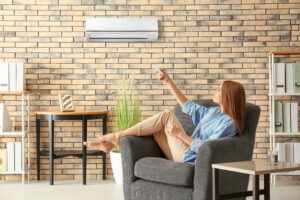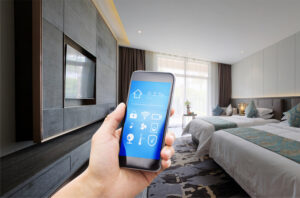Catering to Guest Expectations Post COVID
The Pandemic Has Changed Guest Expectations
Traveler expectations have changed since the pandemic and today’s guests are interested in technology that can offer more convenience, that creates a safer hotel stay and that allow hotels to operate more sustainably. Indoor air quality (IAQ), sustainability and more control of their hotel experience are on the list of priorities for travelers. To cater to these travelers, hotels should invest in technology to better manage energy, such as energy management systems, smart thermostats and IAQ solutions. These technologies can help hotels to improve air quality, to save on energy costs and to better attract sustainable minded travelers.
Sustainability
Toady’s travelers are conscientious about protecting the environment, according to a recent study conducted by Expedia Group, travelers are looking for more sustainable options. The study found that 51% of travelers were willing to spend more on eco-friendly accommodations, 40% sought out accommodations that lessened its environmental impact and 34% used providers who declared a commitment to sustainable practices. In the competitive world of Hospitality, hotels can leverage technology to not only reduce their carbon footprint, but to save on costs and better attract sustainable minded travelers.
Indoor Air Quality (IAQ)
The pandemic has caused guests to be more focused on in-door air quality more than ever before. Guests want to stay at hotels where safety measures have been implemented to offer better in-door air quality. Travelers want hotels to invest in hotel technology in order to create a safer environment and they are actively seeking hotels that are making in-door air quality a priority. According to the U.S. Consumer Sentiment on In-door Air Quality and COVID-19, 91 % of consumers considered in-door air quality to be important in the prevention of COVID-19. 77% believed that in-door air quality would have an impact on which hotels they decided to book. And 52% were willing to pay more to stay at a hotel with better in-door air quality. The survey found that in-door air quality was important to consumers, but they also wanted hotels to clearly communicate the in-door air quality standards that were in place to protect guests.
Reasons for Indoor Air Pollution
Outdoor pollutants, such as nearby construction and the emission of gas particles from vehicle exhaust systems can increase pollutant levels in buildings. The reasons for indoor air pollution, includes damp building areas, secondhand smoke, the burning of fossil fuel, some cleaning methods like vacuuming and some chemicals from cleaning products can linger in the air and can have harmful effects. The air can be occupied by particles, such as dust, as well as viruses and bacteria that are not visible to the naked eye.
Hotels can gain a competitive edge by making improvements to their in-door air quality and by clearly communicating those safety measures. Consumers are more aware of the importance of good in-door air quality and are more likely to stay at hotels that have safety measures in place. Hotels can invest in IAQ solutions that monitor and make improvement to the air quality in hotels. IAQ sensors can be used to monitor and detect pollutants and can be integrated into HVAC systems to improve ventilation.
Technology to Monitor Energy Usage
Energy Management Systems
An energy management system can help hotels to operate their building systems more efficiently, while reducing energy costs. Hotels can use an energy management system to monitor and control all utilities and devices that run on electricity, allowing hotels to reduce energy consumption and costs. Energy management systems can control the HVAC system in guestrooms and the lighting in order to better manage energy usage.
EMS allows hotels to reduce energy consumption by monitoring usage to identify opportunities to decease use, either by reducing energy when guest rooms are unoccupied or during certain times of the day. EMS allows building systems to operate more efficiently and allows hotels to decrease operating costs by using less energy. Hotels can also benefit by attracting more sustainable minded travelers by reducing their carbon footprint.
Technology to Personalize Room Settings
Hotels can cater to guests who prioritize sustainability by giving them more control of their hotel experience. Hotels can offer guests a more convenient and contactless hotel stay with technology such as smart thermostats, mobile solutions, and voice assistants. Smart thermostats allow hotels to apply more sustainable practices by conserving energy while revolutionizing the guest experience. Smart thermostats allow guests to control the thermostats in their guest rooms and set the temperature based on their comfort level. Smart thermostats can also be controlled by the hotel remotely, to turn on in anticipation of guests arriving and to conserve energy when rooms are unoccupied. Guests can also use their mobile devices or voice assistant devices to control the temperature, the lighting and the blinds or curtains allowing them to use energy only when needed.
Vendor Spotlight: Pyure’s Solutions
Pyure’s air purification helps hotels to improve air quality by removing pollutants, such as unwanted orders, cigarette smoke, chemical fumes, and cleaning agents. Pyure’s hydroxyl technology sanitizes and deodorizes the air to kill pathogens and provide around the clock protection. The products are safe to use in occupied spaces and is effective at treating and monitoring air quality.
In addition to improving air quality, Pyure also kills aerosolized viruses, bacteria, mold, and surface pathogens. Hotels have the option to integrate products into existing HVAC systems to continuously treat and monitor air quality. Portable devices can also be deployed in guestrooms and food preparation areas to improve air quality.


